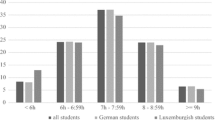Abstract
Punctuality depends on situational factors but seems also a personality trait. Here, we assessed arrival time at a university course (behavioural measure) and punctuality with a self-report measure in relation to morningness-eveningness. We observed arrivals of students in their courses during the first lessons (starting at 8:15). 267 students (43 men, 222 women, 2 not specified) with a mean age of 22.76 ± 3.89 years participated in this study and filled the Composite Scale of Morningness, a self-report for punctuality at University courses, and a short version of the Big Five. Self-reported punctuality score was inversely correlated with arrival time. Morning oriented and conscientious students scored higher on punctuality. Concerning actual arrival time, only CSM scores tended to be related with arrival time. Based on the questionnaire, the only significant predictor was CSM score with 12 % of variance explained. Based on arrival time, CSM scores remained as a predictor but with lower explained variance (1.6 %) while means of transport and weekday emerged as predictors. Students arriving on foot or by bike arrived significantly later. These findings suggest that morningness might be an important predictor of lateness in addition to situational factors.
Similar content being viewed by others
References
Adan, A., Archer, S. N., Hidalgo, M. P., Di Milia, L., Natale, V., & Randler, C. (2012). Circadian typology: a comprehensive review. Chronobiology International, 29, 1153–1175.
Ashton, M. C. (1998). Personality and job performance: the importance of narrow traits. Journal of Organizational Behavior, 19, 289–303.
Back, M. D., Schmukle, S. C., & Egloff, B. (2006). Who is late and who is early? Big five personality factors and punctuality in attending psychological experiments. Journal of Research in Personality, 40, 841–848.
Baehr, E. K., Revelle, W., & Eastman, C. I. (2000). Individual differences in the phase and amplitude of the human circadian temperature rhythm: with an emphasis on morningness-eveningness. Journal of Sleep Research, 9, 117–127.
Berry, C. M., Lelchook, A. M., & Clark, M. A. (2012). A meta-analysis of the interrelationships between employee lateness, absenteeism, and turnover: implications for models of withdrawal behaviour. Journal of Organizational Behavior, 33, 678–699.
Bolton, L. R., Becker, L. K., & Barber, L. K. (2010). Big five trait predictors of differential counterproductive work behavior dimensions. Personality and Individual Differences, 49, 537–541.
Burgess, H. J., & Fogg, L. F. (2008). Individual differences in the amount and timing of salivary melatonin secretion. PloS One, 3(8), e3055.
Conte, J. M., & Jacobs, R. R. (2003). Validity evidence linking polychronicity and Big five personality dimensions to absence, lateness, and supervisory performance ratings. Human Performance, 16, 107–129.
Di Milia, L., & Randler, C. (2013). The stability of the morning affect scale across age and gender. Personality and Individual Differences, 54, 298–301.
Di Milia, L., Adan, A., Natale, V., & Randler, C. (2013). Reviewing the psychometric properties of contemporary circadian typology measures. Chronobiology International, 30, 1261–1271.
Foust, M. S., Elicker, J. D., & Levy, P. E. (2006). Development and validation of a measure of an individual’s lateness attitude. Journal of Vocational Behavior, 69, 119–133.
Gosling, S. D., Rentfrow, P. J., & Swann, W. B., Jr. (2003). A very brief measure of the Big-five personality domains. Journal of Research in Personality, 37, 504–528.
Harrison, D. A., & Price, K. H. (2003). Context and consistency in absenteeism: studying social and dispositional influences across multiple settings. Human Resource Management Review, 13, 203–225.
James, D. T., & Fleck, J. (1986). The relationship of personality to punctuality for a variety of types of appointment. Personality and Individual Differences, 7, 95–102.
Koslowsky, M. (2000). A new perspective on employee lateness. Applied Psychology, 49, 390–407.
Kucharczyk, E. R., Morgan, K., & Hall, A. P. (2012). The occupational impact of sleep quality and insomnia symptoms. Sleep Medicine Reviews, 16, 547–559.
Rammstedt, B., & John, O. P. (2007). Measuring personality in one minute or less: a 10-item short version of the Big five inventory in english and German. Journal of Research in Personality, 41, 203–212.
Rammstedt, B., Kemper, C. J., Klein, M. C., Beierlein, C., & Kovaleva, A. (2013). A short scale for assessing the Big five dimensions of personality - 10 item Big five inventory (BFI-10). Methoden, Daten, Analysen, 7, 233–249.
Randler, C., & Schaal, S. (2010). Morningness-eveningness, habitual sleep-wake variables and cortisol levels. Biological Psychology, 85, 14–18.
Roberts, B. W., Bogg, T., Walton, K. E., Chernyshenko, O. S., & Stark, S. E. (2004). A lexical investigation of the lower-order structure of conscientiousness. Journal of Research in Personality, 38(2), 164–178.
Salgado, J. F. (2002). The Big five personality dimensions and counterproductive behaviors. International Journal of Selection and Assessment, 10, 117–125.
Smith, C. S., Reilly, T. C., & Midkiff, K. (1989). Evaluation of three circadian rhythm questionnaires with suggestions for an improved measure of morningness. Journal of Applied Psychology, 74, 728–738.
Spiegelhalder, K., Regen, W., Kyle, S. D., Endres, D., Nissen, C., Feige, B., & Riemann, D. (2012). Time will tell: a retrospective study investigating the relationship between insomnia and objectively defined punctuality. Journal of Sleep Research, 21, 264–269.
Tsaousis, I. (2010). Circadian preferences and personality traits: a meta-analysis. European Journal of Personality, 24, 356–373.
Acknowledgments
We are grateful to our colleagues for allowing us to sample data during their lessons. Two competent reviewers helped to clarify the manuscript.
Author information
Authors and Affiliations
Corresponding author
Rights and permissions
About this article
Cite this article
Werner, L., Geisler, J. & Randler, C. Morningness as a Personality Predictor of Punctuality. Curr Psychol 34, 130–139 (2015). https://doi.org/10.1007/s12144-014-9246-1
Published:
Issue Date:
DOI: https://doi.org/10.1007/s12144-014-9246-1




